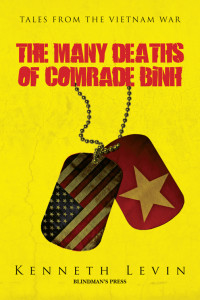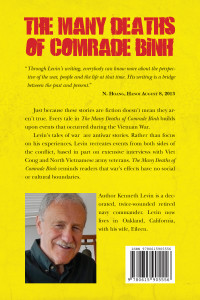The first book review/author interview I wrote for ALIVE Magazine was with Vietnam War Veteran and retired navy commander, Kenneth Levin. His first book, Crazy Razor: A Novel of the Vietnam War, was well received by the usual suspects, but somewhat surprisingly, to the author anyway, it also received high praise from women.
Less than a year later, Levin is back with his new book, The Many Deaths of Comrade Binh, a collection of fictional short stories that may or may not be true. Levin readily admits to some artistic license, but each tale is based on actual events that occurred during the Vietnam War, and once again, the appeal is broad-based.
Twice wounded in the line of duty, Levin remembers the horrors of war all too well. He draws inspiration from his own experiences and those of comrades, allies, and mercenaries, as well as civilians and members of the North Vietnamese army.
Levin never forgets how deeply war affects both combatants and bystanders, or how battle sometimes forces humans to act inhumanely. Many of his stories are capable of moving you to tears—or disturbing enough to keep you up at night.
At the same time, humanity has a knack for survival even in wartime, a truth reflected in Levin’s stories of humor, irony, and love. My favorite, La Bamba, juxtaposes a veteran’s recollection of the first time he heard Harry Belafonte’s version of the song during the war, with dancing to the familiar tune with his two-year-old granddaughter some 45 years later. Such tender story-telling catches the reader by surprise, but keep reading and you’ll find that Levin knows his subject too well to romanticize battle.
Comparable to Bao Ninh’s The Sorrow of War, Levin’s stories are about the terrifying impact of war on ordinary people, offering a little something for everyone.
Alive Magazine: Your first book, Crazy Razor, took you some forty years to write. Then your second, The Many Deaths of Comrade Binh, appears less than two years later. What happened?
Kenneth Levin: Hell if I know. I think once I got up a full head of steam writing, I just didn’t stop. Although Crazy Razor and Comrade Binh are very different books in genre and style, they’re both drawing on the same pool of research, experiences and imagination. I finished Crazy Razor not because I wanted to stop telling the story. I finished it because if I didn’t, it would be too fat and cumbersome. But there was still a whole lot more I wanted to write, a lot more to be said. I also had one particular story in mind that I was either going to turn into another book or a short story. That became the seed for The Many Deaths of Comrade Binh.
AM: Which one was that?
KL: It’s the tale near the end of the book, “My Sweet Daddy…” When I was in Hanoi in 2012, I was trying to find People’s Army combat veterans to interview. I had a list of some two-dozen questions to ask them. Everything from what did you wear on your feet to did you think you’d survive the war? A young woman in the hotel where I was staying volunteered that her father was a vet and she would be glad to ask him the questions. So I gave her a copy and my email address and went on my travels. About a month after I returned to Oakland, I received an email from her with a lengthy attachment. There were all the answers to my questions and much more. I realized here was a story that needed telling. After nearly a year of email exchanges with the daughter, I had the man’s life story. From the child of a farmer, to a soldier, to a POW, to struggling veteran trying to build a life for his wife and children, to a smiling grandfather. His daughter is a gifted storyteller, so together we wrote the short story. But other than the names that she insisted be changed, that story is not fiction. It’s true.
AM: On Comrade Binh’s back cover it says, “Just because these stories are fiction doesn’t mean they aren’t true.” Isn’t this paradoxical? Fiction AND true?
KL: Maybe it is. Every story in the book is based on facts, occurrences, research, experiences. The fiction is the veneer to smooth out the story, protect the subjects and hopefully keep me from getting sued. Some stories are nearly all fact. And some have just a kernel of fact and a big, fat chunk of imagination piled on to make them juicy and delectable. They’re all war stories.
AM: Really? Is “La Bamba,” the story of a grandfather dancing around the den with his granddaughter to Harry Belafonte, a war story?
KL: Yes it is. He’s physically and mentally scarred by war. War has shaped him into what he is. And he’s survived. Survived to the point where he can dance with his granddaughter and get lost for a few minutes in the joy of life, of being able to live life.
AM: In several other stories you write about the veteran, both American and Vietnamese, after the war. Coping. Some well, some not so well. When the war is over, what does a combat veteran do with all those memories?
KL: I don’t know. Dance with their granddaughters? For the combat vet, the war didn’t end when the truce was signed or the grunt or sailor returned home and took off his uniform. War doesn’t end when the scars go from angry red to numb white. It never ends. Do we manipulate our code of ethics according to the context? Much smarter people than I will have to answer these questions. I’m sure many psychologists at the VA are immersed in this serious and knotty question.
AM: Why make the switch from a novel to short stories?
KL: Many of the tales are inherently short and might not blend into the context of the longer tale of a novel. The big roasts and chops went into Crazy Razor. The Many Deaths of Comrade Binh is a collection of delectable scraps. Sausage links – short stories. Some are grim, some are humorous. And some address the question that once the war is over, what does a person do with all these memories? How can one live with oneself after witnessing and committing what by any standards are atrocities? And I seemed to be better at writing short stories.
AM: Why is that?
KL: I’m not sure. Probably because it takes much more patience to write a novel than it does to write a short story. I’m sure the sum of patience required to write some forty short stories is greater than that to write a novel but the pain seems less to me. Comrade Binh and the stories in it also benefited from my learning while writing Crazy Razor. For the first time in seven decades, I learned from my mistakes.
AM: In the beginning of Crazy Razor you say the only villain is war itself. You sticking with that?
KL: Yep.
AM: In both of your books, you write with amazing detail, including smells. Why is that?
KL: Maybe I’ve just got a sensitive sniffer connected to my memory. I had a first grade teacher, Miss Beifus. She wore a distinctive perfume that smelled good. Half a century later I was sitting next to a woman on AMTRAK and she must have been wearing the same perfume. She smelled exactly like Miss Beifus. I could not forget that smell. Nor could I forget the rot of a dead body, sautéed onions and garlic, swampy river water, fish sauce, or cordite.
AM: What’s cordite?
KL: Smokeless gunpowder. Smells like firecrackers.
AM: The Many Deaths of Comrade Binh is a collection of humor, tragedy, sadness, and happiness. Why?
KL: I want to take the reader on a roller coaster ride — make them smile then make them cry in the next story. And I want them to remember the sights, sounds and smells. I told one reviewer that the book is like a heavily seasoned Greek or Italian meal — lots of garlic and onions and oregano and pepper. Long after you finish a meal like that, you’re still burping up garlic and feeling the heat in your belly.
AM: So, what’s next?
KL: Two books are in the hopper. A nonfiction piece based on my late brother’s recently discovered diary that he kept while an army surgeon in Vietnam during 1965 and 1966. And a collection of tales about immigrant European Jewish grandmothers, sort of my version of Sholem Aleichem’s tales of the Shtetls, except on Chicago’s west side instead of Europe. That one will be fun.
AM: You’re obviously busy writing your books. What do you do when you’re not writing?
KL: Nap.
The Many Deaths of Comrade Binh and Crazy Razor, both by Kenneth Levin, are available at Amazon,  BarnesandNoble.com and on his website: kennethlevinauthor.wix.com/blindmanspress.
BarnesandNoble.com and on his website: kennethlevinauthor.wix.com/blindmanspress.
Leave a Reply